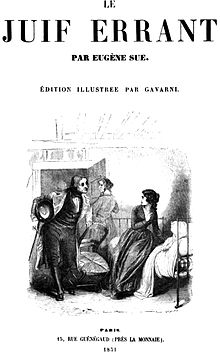Le Juif errant

Title page of an 1851 edition
|
|
| Author | Eugène Sue |
|---|---|
| Original title | Le Juif errant |
| Country | France |
| Language | French |
|
Publication date
|
1844 |
| Media type | |
The Wandering Jew (French: Le Juif errant) is an 1844 novel by the French writer Eugène Sue.
The story is entitled The Wandering Jew, but the figure of the Wandering Jew himself plays a minimal role. The prologue of the text describes two figures who cry out to each other across the Bering Straits. One is the Wandering Jew, the other his sister, Hérodiade. The Wandering Jew also represents the cholera epidemic— wherever he goes, cholera follows in his wake.
The Wandering Jew and Hérodiade are condemned to wander the earth until the entire Rennepont family has disappeared from the earth. The connection is that the descendants of the sister are also the descendants of Marius de Rennepont, Huguenots persecuted under Louis XIV by the Jesuits. Sue never explains how a Huguenot family came to be descended from an immortal Jewish woman who never married or had children. The brother and sister are compelled to protect this very family from all harm. After this first introduction, the two appear only very rarely.
The Rennepont family is unaware that these protective éminences grises exist, but they benefit from their protection in various ways, be it by being saved from scalping by the Native Americans, or from languishing in prison.
The Rennepont family lost its position and most of its wealth during the French persecution of the Protestants (after the revocation of the edict of Nantes in 1685). A small fortune was given to a Jewish banker immediately before the Renneponts dispersed all over Europe and Asia, and this fortune has grown into a huge sum, through the miracle of compound interest. In 1682, the Rennepont family members each got a bronze medal telling them to meet back in Paris 150 years later, at which time the fortune will be divided among the surviving members. So much time has passed, however, that almost none of the still-living Renneponts have any idea why they need to come to Paris. They nevertheless set out from India, Siberia, America, France, and elsewhere to make their way to rue Saint-François No. 3 in Paris by 13 February 1832.
...
Wikipedia
